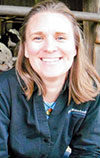The expertise dairy producers need to have today to be successful is overwhelming. Everything from genetic selection, futures pricing, employee management, nutrient management and succession planning – not to mention milk production, feed quality and community relations.
If your dairy advisers aren’t asking you questions to make you uncomfortable and think differently about your dairy, they aren’t doing you any favors. If you have an adviser to your farm who parrots only what today’s flavor-of-the-day expert is touting on the speaker circuit at industry meetings or repeating what you want to hear, that adviser is doing more harm than good to your farm.
Don’t get stuck
Benjamin Franklin once said, “In this world nothing can be said to be certain – except death and taxes.” Franklin didn’t visit dairy farms often enough then, because he would have surely added manure to that list.
Manure and its components will continue to be a driving force in our industry, with increasing emphasis on management practices.
Dairy farms able to turn their manure into reoccurring revenue, actual dollars added to the bottom line, will be the ones gracing magazine covers or presenting at conferences with others saying, “Why didn’t we think of that?” Innovative ideas include turning manure into biodegradable flower pots or converting manure into the fuel that runs your farms and powers your trucks.
Are your nutrient management advisers asking you tough questions about what you’re putting into your manure stream and why? Are they helping you consider other options for waste removal? Have you attended a seminar focused on new manure management technologies?
Have you talked to your neighboring dairies and local government administrators about how you can partner to gain scales of efficiencies?
In reality, manure and nutrient management are just examples on a long list of everyday things that happen on the farm where we can get stuck in old habits. The same could be said for heat detection, reproduction, nutrition ration or calf care, just to list a few others. What areas on your farm could use a few curve-ball questions to help you look at your operation in a new way?
Do your homework
Before you make a judgment on a new (or old) product, procedure or practice being done on a farm, do you go see for yourself? Or do you take your veterinarian, nutritionist, neighbor or extension agent’s word for it? Whether your opinion is positive or negative, have you taken the time to see for yourself?
I’m impressed with those who take time to tour facilities, call producers, go back to take measurements and watch cows when no one is around. Time is limited, with many demands, and it’s not always convenient to make a trip (let alone multiple ones). Those who spend the time in planning and understanding often see smoother transition times and are exposed to new ideas sooner.
“Because we’ve always done it this way,” has not been and will not be the way to find success in the future, and those who are doing their homework will find ways to decrease cow stress and improve overall efficiencies.
Do your advisers encourage you to visit new dairies? Do they help coordinate a trip for you to do so? It’s great that some facilities are staffed and equipped to handle large groups, but what about the dairy next door to that one? What are they doing different? What is working for a farm not as well publicized? Are your advisers helping you determine where you have been “getting by” or “making do” and how you improve those areas?
10 more pounds of milk
If you had the 10 more pounds of milk every salesperson who stepped into your yard promised or every academic researcher found in one study or another, you wouldn’t need to be farming anymore.
There is no cure-all or sure fix for every farm. Management styles are different. Buildings were built at different times, and layouts of facilities are different. Goals are different. Herd genetics are different. Labor and material availability are different. Feed quality is different.
Advisers should present new ideas, dig deeper with questions to clarify why are you doing things the way you are and determine ways to test and monitor multiple possibilities without having preconceived notions on what will or won’t work.
Do the people supporting you know what you are looking for? Is it more efficiency, higher quality or lower operating costs? “More milk” isn’t always the answer you’re looking for.
Dairy margins are too tight to risk narrow-focused thinking on new opportunities that increase efficiency and improve your farm. If you have a yes-man (or woman) adviser, consider replacing him or her with one who will challenge you to be more efficient and seek out improvements. ![]()

-
Amy Throndsen
- Chief Operating Officer
- Advanced Comfort Technology
- Email Amy Throndsen






